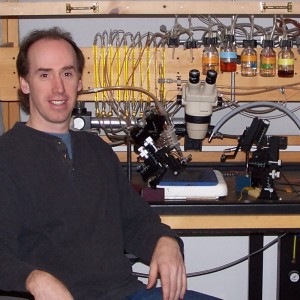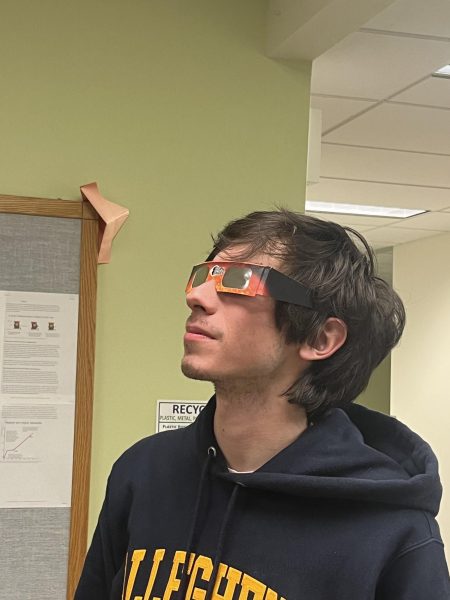Coates retires after more than 26 years of teaching at Allegheny
Lee Coates retired from Allegheny College last year after serving as a professor of biology, neuroscience and global health studies since 1992.

Coates spent two years at Bucks County Community College in Bucks County, PA, studying biology before transferring to the University of Montana where he received earned his bachelor’s in Zoology. Coates went on to receive a doctorate in physiology from the University of New Mexico and worked as a postdoctoral fellow in neurophysiology at Dartmouth Medical School.
In 1992, Coates accepted a one-year temporary teaching position at Allegheny.
“I was at Dartmouth Medical School in a postdoctoral position that was focused on research, so I had done some teaching to medical students, and I had really liked the teaching aspect of the area I was in,” Coates said. “I also saw all the pressures that full time researchers were under, and it wasn’t that appealing to me to be that dependent on getting grants.”
Instead, Coates decided to pursue teaching.
“I thought it would be nice to do a year of teaching to see if I liked it,” he said.
Coates’s one-year temporary position in neuroscience became not so temporary. His position was extended into a two-year position. Coates ended up teaching at Allegheny for 26 years.
“At that point, I discovered that at a liberal arts college, you can actually do research and teach, but you’re not primarily a researcher like you would be at a big university,” said Coates, “What appealed to me was the balance between teaching and research.”
Coates explained that he enjoyed getting to know the students at Allegheny, as well as being given the opportunity to teach many different courses.
“I really got to know the students I was working with, which was a benefit as well,” said Coates. “At a university, you are so narrowly focused on what you are doing and you can’t really bridge out of that.”
While at Allegheny, Coates was able to teach a wide variety of courses, including Organismal Physiology and Ecology, Animal Physiology, Sensory Neurophysiology, The Science and Pseudoscience of Alternative Medicine, Investigative Approaches in Biology, History of Neuroscience and Foundations of Neuroscience. Coates also worked with colleagues in the Department of Psychology to establish a neuroscience major at Allegheny.
“The fact that Allegheny College has senior projects meant that I had to have an active research program that engaged students in my research,” Coates said.
Coates’ general research interests are sensory neurophysiology and comparative animal physiology.
As part of his graduate work, Coates investigated nasal carbon dioxide receptors.
“Really I was studying the control of breathing,” Coates said.
“I’m a physiologist (and) neuroscientist who studies how the brain controls breathing,” Coates said, “I was very interested in how the body senses carbon dioxide.”
Coates explained that mammals have both carbon dioxide receptors in your nose as well as your brain.
“The brainstem receptors are the ones responsible for let’s say if you are holding your breath for a minute or two, eventually the carbon dioxide goes up and receptors in the brain say that carbon dioxide is high, and I’m going to make you breathe,” Coates said.
“We actually regulate carbon dioxide more than we do oxygen,” Coates said.
Although many people believe oxygen is more important, carbon dioxide is actually the more important respiratory gas for land animals.
Coates has also used his investigation of nasal carbon dioxide receptor mechanisms to research sudden infant death syndrome.
“SIDS has a definition of exclusion,” Coates said. “You have a normal healthy baby that stops breathing and dies, and if you rule out everything else, you label it a SIDS death,” said Coates. Since SIDS has a definition of exclusion, the exact cause of SIDS is unclear.
“What folks think is happening, is that babies will often be on their stomachs and will start breathing their own expired air, which has carbon dioxide in it,” explains Coates.
Research about SIDS possibly being caused by babies sleeping on their stomachs led to the Back to Sleep campaign, which advocates for babies sleeping on their backs.
“[Back to Sleep] was an educational program that educated parents to put their babies on their backs instead of their stomachs, and that actually reduced SIDS by half,” Coates said.
In addition to researching carbon dioxide receptors, Coates has also researched Alzheimer’s disease.
“We are looking at interventions that will reduce Alzheimer’s,” Coates said. “There’s no cure for Alzheimer’s, but there might be interventions that slow the progression of the disease.”
Although Coates retired this year, he is still on campus helping students with their senior projects. Coates currently has students looking at exercise, diet and mental activity to see if any of these interventions help slow the progression of Alzheimer’s.






